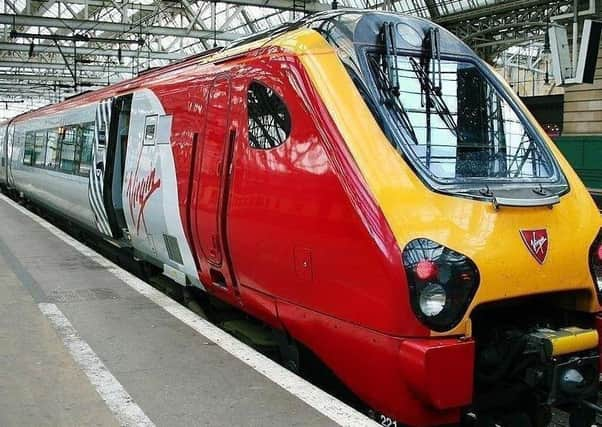YP Letters: Competition hits buffers on railways


TONY Lodge, of the Centre for Policy Studies, is somewhat selective in his choice of facts to support arguments for more competition on railways (The Yorkshire Post, March 3). Rail privatisation set up by John Major actually made on rail competition difficult and cost a lot. No wonder John Major never mentioned it in his autobiography.
Railways are already competing with air travel, cars, buses and coaches as alternatives for many journeys
Advertisement
Hide AdAdvertisement
Hide AdCompetition doesn’t necessarily bring happy passengers. Competing trains run by TransPennine Express and Northern Rail go from Leeds to Manchester. This hasn’t driven up quality. Overcrowding can be some of the worst I’ve endured even in years of London commuting. Avoid Friday evenings at all costs.
What brings service improvements is managerial and workforce commitment. Luckily we have these on most lines from Yorkshire. It is helped by adequate resources. Even the allegedly inefficient British Rail made remarkable improvements in East Coast Main Line services, as timetable records show. And their ageing coaches remain superior to most other inter-city express trains.
One industry expert, Roger Ford of Modern Railways magazine, calculates that the privatised rail network now absorbs between four and five times as much public subsidy in real terms as the old nationalised industry. So competition isn’t the be and end all. Commitment and resources are far more important.
Private firms take on NHS
From: Joe Dillon, Hammerton Drive, Hellifield.
LAST Saturday, along with hundreds of thousands of people from across the country, I proudly marched in London as part of the Save Our NHS demonstration.
Advertisement
Hide AdAdvertisement
Hide AdWe marched to protest about the increasing privatisation and under funding of our NHS. As the American philosophiser and historian Noam Chomsky says “the standard technique of privatisations is defund, make sure things don’t work, people get angry, and hand it over to private capital”. This is what is starting to happen to our NHS.
Private companies are bidding for and getting huge NHS contracts, such as Virgin care, and Care UK, etc and hide behind the NHS logo so the vast majority of us don’t know that they are increasingly running sectors of our NHS, from sexual health to out-of-hours care.
Most worryingly, NHS England is promoting Sustainability and Transformation Plans (STPs) which they claim brings decision making within the NHS under local control, but the Chartered Institute of Public Finance and Accountancy (CIPFA) in November 2016 said “STPs are the mechanism to deliver the NHS five-year forward view, particularly the required savings of £22bn”. No wonder my fellow NHS marchers refer to STPs as ‘Slash Trash and Plunder’.
The most moving speech I heard on Saturday was made by Dr Yannis Gourtsoyannis, who simply read from the leaflet which was delivered to every household in the UK when the NHS was founded in 1948, and explained to our parents, grandparents and, in my case my great-grandparents, that “it will provide you with all medical, dental and nursing care. Everyone – rich or poor, man, woman or child – can use it or any part of it. There are no charges, except for a few special items...”
Rock stands in way for EU
From: Alan Chapman, Beck Lane, Bingley.
Advertisement
Hide AdAdvertisement
Hide AdYOUR edition (The Yorkshire Post, March 3) provided us with two excellent articles, first from Dr John Sentamu, the Archbishop of York – “Now is not the time to get in way of PM’s Brexit plan” – where he explains his own experience of forcibly leaving Uganda and arriving in the UK.
He sympathises with EU nationals living in the UK who want assurances they can remain after the UK disentangles from the EU. Dr Sentamu accepts the same protection towards UK ex-pats living on mainland Europe, and not tying the hands of Theresa May when negotiations commence this year.
Secondly, Bill Carmichael exposes the “undemocratic freeloaders without peer”, advocating changing the House of Lords from appointees to elected members with very significantly lower numbers.
Both articles partly overlap on the subject of people who live abroad from their country of origin. In these complex negotiations the UK has a little- mentioned Achilles heel, namely Gibraltar. Spain continues to push to re-acquire “The Rock”, while holding the future of hundreds of thousands of UK citizens in southern Spain, mainly retired folk.
Advertisement
Hide AdAdvertisement
Hide AdGiving EU nationals guaranteed residence rights before the Gibraltar question is settled makes the UK’s position weaker, suiting the Remain camp manifested in the Lords.
Make a date with seasons
From: Tony Drake, Knedlington Road, Howden.
MAY I suggest that D Webb (“Spring has not yet sprung”, The Yorkshire Post, March 6) does some research regarding the dates of the seasons?
Firstly, the only known ‘official’ I know who determines the seasons is Mother Nature. She has worked out the seasons for us according to the weather conditions and the solstices and the equinoxes.
The summer solstice marks mid-summer and the winter solstice marks mid-winter, the spring equinox marks mid-spring and the autumn equinox marks mid-autumn. If the spring equinox marks the beginning of spring then the seasons are not three months long. Candlemass (February 2) is the Christian Feast of Lights, the pagans celebrated it also, as Imbolc, the first day of spring.